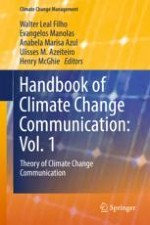
2018 | OriginalPaper | Chapter
Africa’s Dilemmas in Climate Change Communication: Universalistic Science Versus Indigenous Technical Knowledge
Authors : Innocent Chirisa, Abraham Matamanda, John Mutambwa
Published in: Handbook of Climate Change Communication: Vol. 1
Publisher: Springer International Publishing
Activate our intelligent search to find suitable subject content or patents.
Select sections of text to find matching patents with Artificial Intelligence. powered by
Select sections of text to find additional relevant content using AI-assisted search. powered by